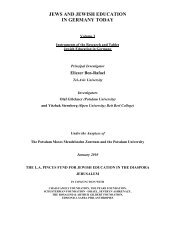jews and jewish education in germany today - The Westbury Group
jews and jewish education in germany today - The Westbury Group
jews and jewish education in germany today - The Westbury Group
Create successful ePaper yourself
Turn your PDF publications into a flip-book with our unique Google optimized e-Paper software.
new immigrants. And that’s the second <strong>in</strong>centive, why I ran for office. It’s not that the others didn’t try to<br />
champion on the immigrants’ cause. I just th<strong>in</strong>k that because they themselves are not immigrants, maybe<br />
they aren’t as able to see the situation as clearly as someone who is an immigrant themself. That was the<br />
second motivation for me, but I was approached, <strong>and</strong> the ma<strong>in</strong> th<strong>in</strong>g is that I was also very young. I was<br />
just 21 years old.<br />
<strong>The</strong> political spread there is very clear, there is a fraction, <strong>and</strong> there are 17 seats [<strong>in</strong> the JC board of<br />
Frankfurt]. 15 seats are taken by the fraction; honestly, there isn’t a lot of room for me to be active. That’s a<br />
normal political process. I don’t want to criticize the process <strong>in</strong> <strong>and</strong> of itself. We can have different<br />
op<strong>in</strong>ions about politics, but the process itself is democratic, there were elections <strong>and</strong> many immigrants<br />
voted for the non-immigrants. It’s a completely normal political process.<br />
● Do you have the impression that with your generation someth<strong>in</strong>g is develop<strong>in</strong>g ak<strong>in</strong> to a k<strong>in</strong>d of<br />
patriotism for Germany?<br />
I underst<strong>and</strong> the question. I’ll give you a good, I don’t know if good, but fitt<strong>in</strong>g example. I applied for<br />
German citizenship <strong>and</strong> was accepted, but I still haven’t taken it. Pragmatically speak<strong>in</strong>g there’s no reason<br />
not to take on German citizenship. However, I’m still hesitat<strong>in</strong>g, <strong>and</strong> that’s not only because dual<br />
citizenship [Ukra<strong>in</strong>ian, German] will probably not work. But people that are just a bit younger than me,<br />
they h<strong>and</strong>le it <strong>in</strong> a more relaxed way. For example, I also have a lot to do with younger people <strong>in</strong> our<br />
organization who are 18, 19, 20 years old. <strong>The</strong>y aren’t hung up on this. As soon as they turned 18, they<br />
took on German citizenship. It’s a process that will work out over generations. Many former immigrants <strong>in</strong><br />
the middle age group <strong>and</strong> also the elderly take German citizenship.<br />
But does German citizenship automatically imply a certa<strong>in</strong> patriotism? That’s another question. I th<strong>in</strong>k that<br />
the reservations towards Germany amongst the older generation, those over 50, will always rema<strong>in</strong>. <strong>The</strong><br />
younger you are, the less reservations you have, <strong>and</strong> therefore the more open you are to patriotism. But you<br />
also have to take <strong>in</strong>to consideration that there’s a huge sociological debate about how patriotic Germans are<br />
anyway. <strong>The</strong>y also have problems with their own history. <strong>The</strong>n to dem<strong>and</strong> from the Jews, that they are<br />
more patriotic than the Germans, it’s too early for that.<br />
● Are the relations of the FSU immigrants becom<strong>in</strong>g more <strong>in</strong>tense to their former home?<br />
What do you mean with “home”?<br />
● <strong>The</strong> former country of residence.<br />
No.<br />
● <strong>The</strong>re is also low motivation for re-migration or second migration, or liv<strong>in</strong>g a transnational existence?<br />
<strong>The</strong> simplest answer to that question is when you have moved, this is simply the practical, the pragmatic<br />
answer; then it’s very difficult to pack up <strong>and</strong> move aga<strong>in</strong>. I mean with acquir<strong>in</strong>g a new language aga<strong>in</strong>, a<br />
new culture, population, mentalities <strong>and</strong> so on - unless you go to Austria, but there you’ve also to accept a<br />
different mentality. I can say for me <strong>and</strong> my friends that we might want to go out <strong>in</strong>to the wider world, to<br />
America, South America, Asia, but very few of us will really move aga<strong>in</strong>. And “back to the roots” will also<br />
not happen, at least not on a large scale. <strong>The</strong>re are always <strong>in</strong>dividual people who will come back from<br />
Israel or from Germany, but a global “back to the roots” won’t happen.<br />
● What do you th<strong>in</strong>k about the future Jewish immigration from the former Soviet Union to Germany? Will<br />
there be more?<br />
111 | P a g e



